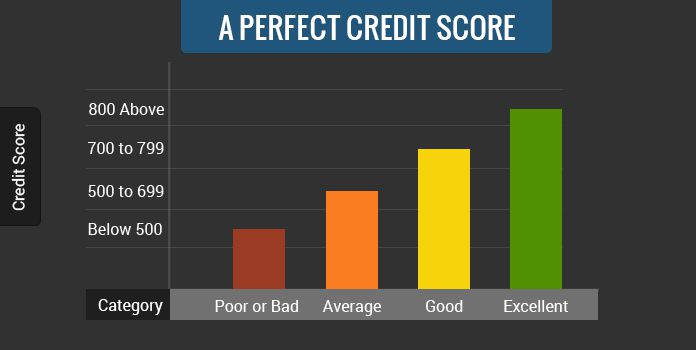How Can You Get A Perfect Credit Score?

Last Updated : Sept. 14, 2020, 11:21 a.m.
In a recent survey by TransUnion CIBIL, it was revealed that 74% of people check their credit score at least twice in a year. The main reason behind this interest is to either increase the score or start a new credit line.
Your CIBIL score or credit score is not just a calculation of the bills you pay or credit lines you have, rather it is an aggregate of multiple factors. That being said, a perfect credit score has many benefits such as fast loan approvals, higher limit credit cards, and lower interest rates. The better your credit score, higher will be the bank’s trust in you. Not only that, in fact, mobile phone providers also check your credit score to analyse your postpaid bill limit.
However, what is a perfect credit score?
Let’s find out.
A Perfect Credit Score
| Category | Credit Score |
|---|---|
| Excellent | 800 and above |
| Good | 700 to 799 |
| Average | 500 to 699 |
| Poor or bad | Below 500 |
While excellent credit score can be your perfect credit score, poor or bad range terms you as highly irresponsible with credit. Good means that you are decent but you have missed a payment or two, and average says that you should start working on your credit management skills.
For banks to give you credit, you need to fall in excellent range or at least good range. This is not to say that you can’t improve your credit score but you just need a good or excellent score for enhanced credit benefits.
Getting a Perfect Credit Score
There is no magic trick to increase your credit score . However, here are some tips to become great at credit management.
Zero Credit May Not Be As Beneficial
Paying your bills on time is one thing but paying them as soon as they arrive will not get you in the good books. You should have some credit and there is no point in paying your credit card bill as soon you receive the message or email. For instance, if you are paying a credit card bill of INR 70,000 instantly, then you are losing out on the interest. If you would have kept this amount in your account for the grace period, then you would have earned some interest on it.
While that is true, paying only the minimum amount or delaying the credit card payment can have a negative effect. You will personally have to pay a lot of interest.
A Balanced Credit Utilization Ratio
If you add all your outstanding credit, then it should be only 20% to 30% of your total credit availability. This percentage often earns brownie points for your credit score. When the utilization increases 30%, it generally indicates poor credit management skills or high debt.
But, again, this is not the final sentence, many people have more utilization ratio and a perfectly healthy credit score. This comes with time and by constantly proving your creditworthiness.
A Good Credit Portfolio Mix
Having a decent credit portfolio mix works in your favor as credit agencies always look for people who can handle different types of credit. Your bank would want to see how you manage loans, investments, credit card debt, etc. When you handle the responsibility of different credits with ease, creditors are more likely to approve your credit and your credit score increases.
The Credit History Roadmap
With a perfect payment of 6 months, creditors or the banks are less likely to trust you. However, with a credit roadmap of 10 years, you will become a trustworthy borrower. This is also why it is not advised to close your oldest credit lines. Keep your oldest credit card and use it regularly. Closing the oldest credit card or old accounts can reduce your utilization, hence, affecting your CIBIL score negatively.
Don’t Keep Applying For Credit
Becoming a nag when it comes to applying for credit will only affect your credit score negatively. Every time you apply for a new credit card or loan, a hard inquiry is done on your credit score. Too many hard inquiries term you as a credit hungry person. Hence, apply efficiently and only when credit is needed.
